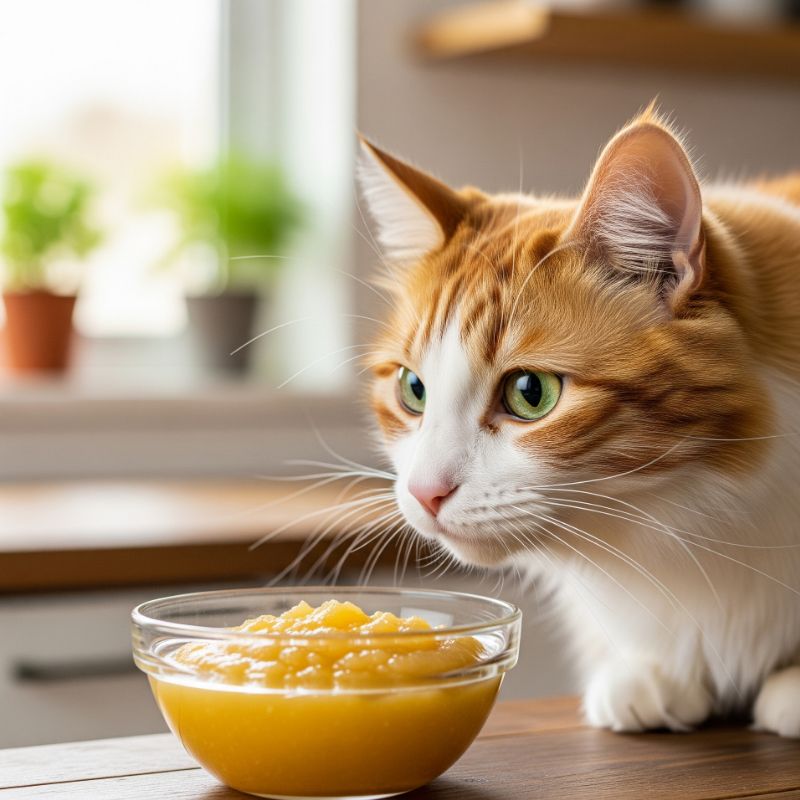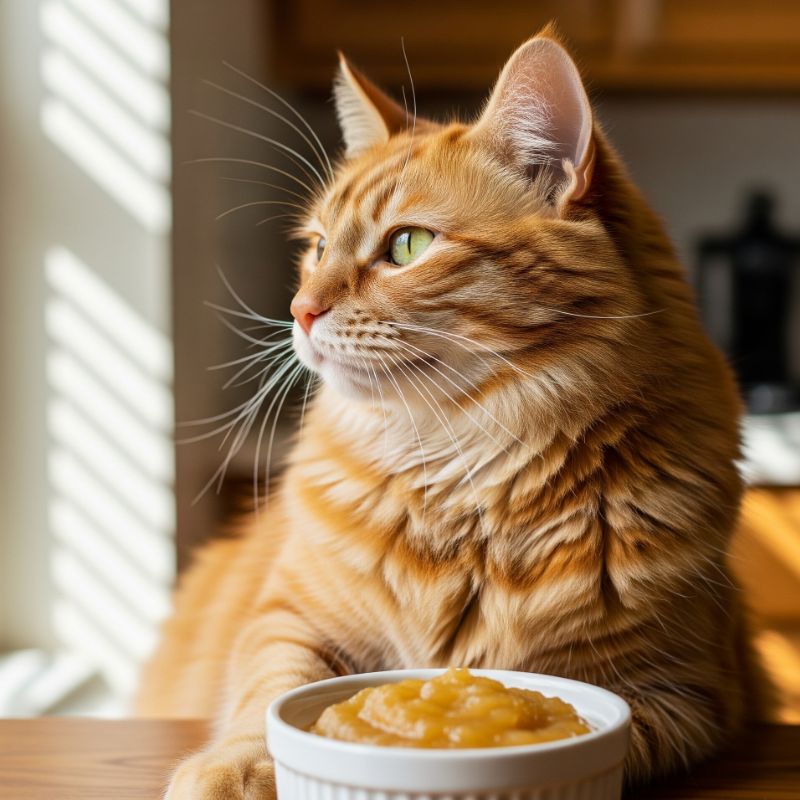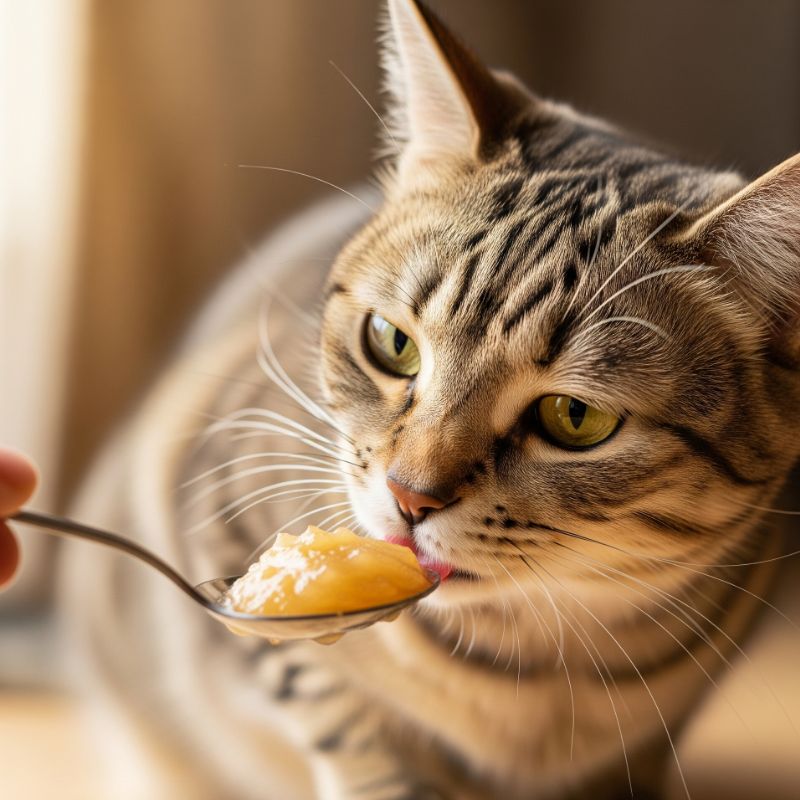You might be opening a cup of applesauce for a quick snack and notice your cat watching with intense curiosity. It’s a common question for pet owners: can our feline friends share in the simple foods we enjoy? While the original fruit is one thing, its processed form is another matter entirely. So, before you offer a spoonful, let’s get a clear and safe answer to the question, can cats eat applesauce? This guide will break down the risks, ingredients, and safer alternatives.
Can Cats Eat Applesauce?
Yes, cats can eat a very small amount of applesauce, but only if it is completely plain, unsweetened, and free of any additives or spices. While the apple pulp itself is not toxic, the way applesauce is commercially prepared makes most store-bought versions unsuitable and potentially unhealthy for cats. The high sugar content and added ingredients are the primary reasons for concern, making it a snack that should generally be avoided.
What’s Really Inside Commercial Applesauce?
The biggest problem with answering “can cats eat applesauce?” lies in the ingredient list of most products on grocery store shelves. These additives are what turn a simple fruit puree into a risky treat.
- High Sugar Content: Most applesauces are loaded with added sugars or high-fructose corn syrup. A cat’s body is not designed to process sugar, which can lead to digestive upset, obesity, and diabetes.
- Preservatives: Chemicals like citric acid or other preservatives can cause stomach irritation in sensitive cats.
- Spices: Some brands contain spices like cinnamon. While a tiny amount of Ceylon cinnamon isn’t toxic, Cassia cinnamon contains coumarin, which can be harmful in larger doses. Nutmeg, another potential additive, is toxic to cats.
This issue of added ingredients is common in many human foods. For example, when asking can cats eat peanut butter, the main danger isn’t the peanuts themselves, but the potential for the deadly sweetener xylitol.
Are There Any Health Benefits for a Cat?
For a cat, applesauce offers virtually no nutritional benefits. Cats are obligate carnivores, meaning they get their essential nutrients from meat-based protein and fat. Applesauce is primarily carbohydrates and sugar. While it contains a small amount of fiber and Vitamin C, these are not nutrients a cat needs from a fruit source. It’s essentially empty calories. This is different from the whole fruit, as the answer to can cats eat apples at least involves some minor fiber benefits from the flesh.
Homemade vs. Store-Bought Applesauce: Is There a Difference?
Yes, there is a significant difference in safety, though homemade is still not a necessary treat. A homemade version gives you complete control over the ingredients.
| Feature | Store-Bought Applesauce | Plain, Homemade Applesauce |
|---|---|---|
| Sugar | Usually very high (added sugars) | Contains only natural fruit sugars |
| Additives | Often contains preservatives and spices | None |
| Safety Rating | Not Recommended | Safer, but still not necessary |
What Are the Main Health Risks to Consider?
Even with the safest, plainest applesauce, there are still potential downsides for your cat. The primary risks include:
- Digestive Upset: The sugar and fiber can be too much for a cat’s sensitive stomach, leading to diarrhea or vomiting.
- Empty Calories: It provides calories without the essential nutrients a cat needs, which can contribute to weight gain if given regularly.
- Underlying Health Issues: For cats with diabetes or kidney disease, the sugar content makes applesauce a particularly bad idea.
It’s vital to know which foods pose a severe risk. While applesauce is a minor risk, some foods are deadly. A question like can cats eat grapes is met with a hard “no” from vets because of their extreme toxicity.
What Is a Safe Serving Size?
If you choose to offer plain, unsweetened applesauce, the amount must be tiny. A safe serving is no more than half a teaspoon, offered on a very rare occasion. It should never be a regular part of their diet or used as a meal topper. Think of it as a taste, not a treat. Even simple fillers should be limited; for instance, the advice for can cats eat rice is also to keep portions very small.
What Are Better and Healthier Treat Options?
Instead of a sugary, low-nutrient food like applesauce, there are many better options that are both safe and beneficial for your cat. At petomiz, we always recommend prioritizing species-appropriate nutrition. Healthy alternatives include:
- Small pieces of cooked chicken, turkey, or fish (unseasoned).
- Commercially formulated, low-calorie cat treats.
- A small amount of catnip or a lickable cat treat from a tube.
Some human foods are safer than others. For example, while the answer to can cats eat popcorn is a cautious “plain only,” other fruits can be a better choice than applesauce. You can learn more about feline nutrition from credible sources like the Cornell Feline Health Center.
Conclusion
To conclude, can cats eat applesauce? While a tiny taste of the plain, unsweetened variety isn’t toxic, it’s a snack that offers far more risks than rewards. The high sugar and potential for harmful additives in commercial brands make it a poor choice for your carnivorous companion. By sticking to meat-based treats and snacks designed for felines, you can ensure you’re giving your cat the best possible care for a long and healthy life.
Frequently Asked Questions About Cats and Applesauce
Here are quick answers to some common follow-up questions about cats and applesauce. This information is for general guidance and is not a substitute for professional veterinary advice.
1. Is cinnamon in applesauce safe for cats?
No, it is not recommended. While a tiny amount of Ceylon cinnamon is not toxic, the more common Cassia cinnamon contains coumarin, which can be harmful. It’s safest to avoid it altogether.
2. Can applesauce help a cat with an upset stomach?
No, applesauce is not a good choice for an upset stomach due to its sugar content, which can worsen diarrhea. A bland diet of boiled chicken and a little white rice is a better option.
3. What about applesauce for kittens?
Kittens have even more sensitive digestive systems and specific nutritional needs for growth. You should never give applesauce to a kitten; stick to food specifically formulated for them.



